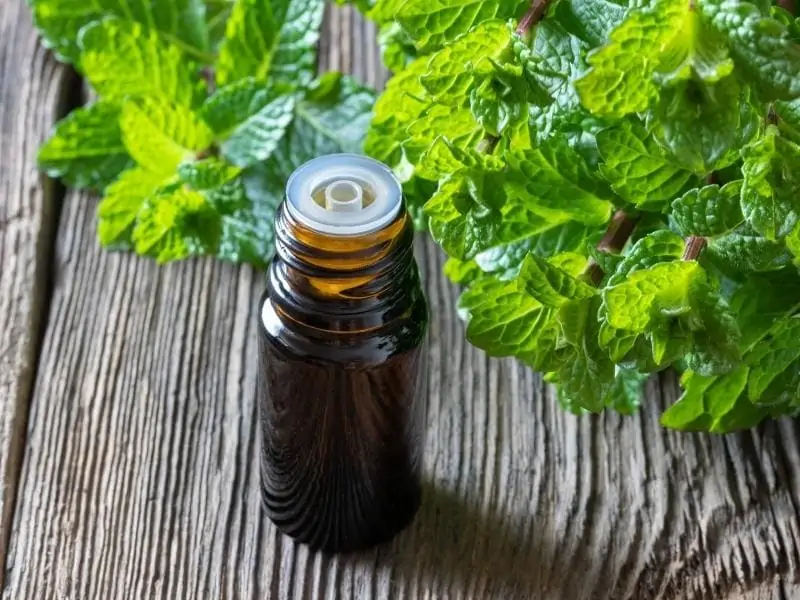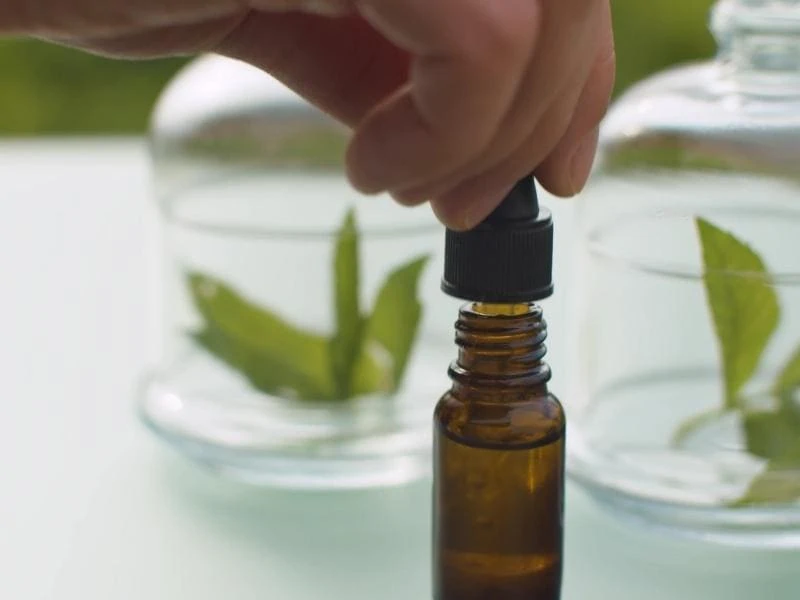Peppermint oil has many health benefits for people. It is used for treating coughs and colds, reducing pain and muscle aches. But just because peppermint essential oil is beneficial for people, it doesn’t mean it’s good for dogs.
So, is peppermint oil safe for dogs? Peppermint oil, like many other essential oils, is toxic to dogs. If enough peppermint oil is ingested, it can cause gastrointestinal upset and lead to vomiting and diarrhea. In some cases, peppermint oil can cause breathing difficulties, skin irritation, and burns in dogs and cats.
Avoid giving your dog any essential oils, especially in their undiluted form. Keep reading to learn more about the risks of peppermint essential oil for dogs. We’ll also tell you what to do if your dog inhales or ingests peppermint oil.
How Much Peppermint Oil Is Toxic to Dogs?
It’s not clear how much peppermint oil is fatal to dogs. The level of toxicity varies greatly and depends on the size of a dog.
For example, a tiny Chihuahua may experience weakness, drooling, lethargy, or other symptoms of peppermint oil poisoning after ingesting only a few drops. On the other hand, a large dog like a Rottweiler may not experience any symptoms after consuming a teaspoon of peppermint essential oil.
The ASPCA lists mint and peppermint oil as toxic for dogs, cats, and horses. So, err on the side of caution and don’t use peppermint oil in your home or near your pets.
Dangers or Risks of Peppermint Oil for Dogs

Some essential oils are toxic to dogs. Essential oils like eucalyptus, cinnamon, citrus, pennyroyal, peppermint, tea tree (melaleuca), pine, sweet birch, wintergreen, and ylang-ylang.
If your dog were to come into contact with peppermint oil or any other of these essential oils, its symptoms could vary. While some dogs don’t experience any symptoms or have a mild gastrointestinal upset, others develop severe reactions and need immediate veterinary care.
Whether you suspect or know your dog ingested some peppermint oil, look out for the following symptoms of essential oil poisoning:
- Lethargy
- Weakness
- Vomiting
- Diarrhea
- Drooling
- Difficulty breathing
- Muscle tremors
- Difficulty walking
- Pawing at face or mouth
- Irritated skin
- Burns or redness on the skin, gums, or tongue
Keep in mind that diffusing essential oils in your home can be as dangerous for your dog as ingesting undiluted essential oil.
Diffusers are the cause many dogs get sick from essential oils. When you use a diffuser, it sends tiny driblets of essential oils into the air.
As your dog breaths the air, these tiny drops get inside its lungs, causing respiratory problems. Also, a dog can easily knock the diffuser and lick the contents.
The same droplets from the air will fall on your dog’s coat, where the dog can ingest them easily while grooming.
Even if you use a non-toxic essential oil safe for pets, you shouldn’t use diffusers near your dog.
What to Do When Your Dog is Exposed to Peppermint Oil?
The tricky thing about dogs and peppermint oil is that symptoms vary and can be very unclear.
If you discover that your dog has essential oil on its coat, use mild dishwashing soap to wash the oil off immediately. However, if you suspect that your dog inhaled or ingested peppermint oil, take it to the vet as soon as possible.
If your dog shows any symptoms of essential oil toxicity like weakness, vomiting, drooling, or other signs of illness, your vet will do blood tests to check if your dog’s kidneys and liver are affected.
Depending on your dog’s condition, the vet may use medication to prevent or treat vomiting. And also administer protectants for the stomach, antibiotics, pain meds, and medication designed to protect the liver and kidneys.
In severe cases, IV fluids and a feeding tube might be necessary for dogs who developed burns in their throats and mouths after licking the peppermint oil.
Is the Smell of Peppermint Oil Harmful to Dogs?
Inhaling peppermint oil is another concern for dogs. A dog’s sense of smell is between 10,000 to 100,000 times more acute than that of people. Dogs also have more scent receptors which are why they have better-smelling abilities than humans.
Essential oils are so concentrated that it may take thousands of pounds of plant material to make 16 ounces of quality oil. This makes essential oils many times more powerful than the ingredients they are made of.
Regardless of the type, all essential oils are harmful to the dog’s airways and lungs when inhaled directly.
Keep this in mind if you diffuse essential oils in your home. A dog sniffing the diffuser can inhale peppermint oil straight into its airways, which can be disastrous.
If you decide to use diffusers, always keep them and essential oils out of your dog’s reach. Also, avoid diffusing oils at your dog’s nose level, as the smell can be overwhelming and cause stress in your dog.
Don’t forget, dogs have a superior sense of smell. While you are barely smelling the aroma of the essential oil, your dog might be experiencing a sensory overload.
Conclusion
Essential oils and aromatherapy have health benefits for humans, but they might be dangerous for dogs. Like many essential oils, peppermint oil is toxic and can cause mild to severe symptoms in dogs.
The biggest problem with peppermint oil is that it’s not clear what amount is fatal to dogs. Symptoms of toxicity vary greatly from vomiting, diarrhea, drooling, lethargy to muscle tremors.
If you decide to diffuse essential oils, keep the diffuser away from your dog. Do not diffuse peppermint oil or other dangerous essential oils near your dog.
Related Articles:


0 Comments